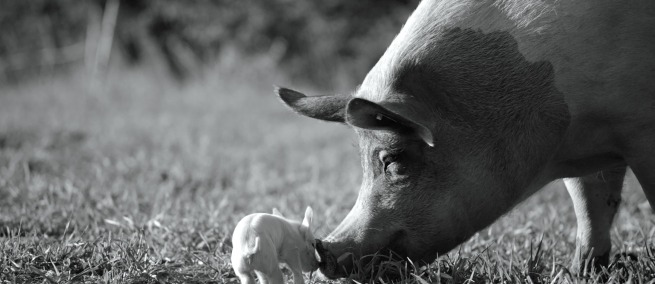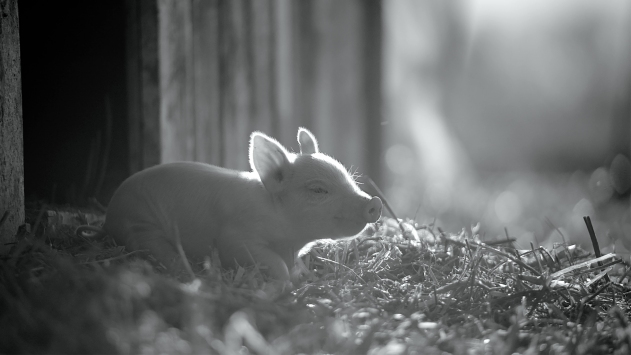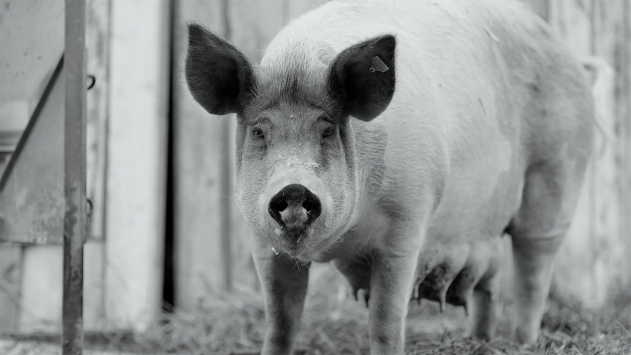
Filmed in black and white, without music or voiceover, Victor Kossakovsky’s acclaimed documentary GUNDA—shortlisted for an Academy Award—follows the daily life of the eponymous mother pig, her piglets, and the animals she lives with. Kossakovsky's style invites viewers to rethink their relationship to these often-overlooked farm animals.
We attended the premiere of GUNDA at the 2020 Berlinale. The film is now in wide release with NEON. We spoke with Kossakovsky about his passion for the subject, what’s remarkable about pigs, and his next project.
Science & Film: Gunda doesn’t seem to live in as confined a space as other farm animals. Why did you choose to film her in particular?
Victor Kossakovsky: Gunda is peerless; she has space to walk and go outside—most [farm animals] never have a chance. If I were to film in the conditions in which 99% of them live now, then people would pay attention to the horrible conditions, not the fact that they have personalities. They will not look at them. This is also why I didn’t film the slaughtering house, because it takes attention away from the most important part: to accept that they have personalities—they are not something, they are someone. This is what was crucial for me, which is why I eliminated any voiceover and music. I wanted people to just watch animals as they are. That’s why [I chose] Atmos sound and those long shots without much editing. That’s why I wanted to keep this tough moment when she kills the baby because I didn’t want to make propaganda and say, she’s nice. Who am I to judge her?
You came to Berlin to watch movies, why did you choose to see this movie?
S&F: Part of why I saw GUNDA is that it’s always frustrated me how some people speak about non-human animals using human attributes like language and then validating that creature’s existence based on that metric.
VK: Absolutely. If we continue in this wrong way, then pigs are definitely the last ones you should eat because they are second in intelligence; they are more intelligent than the octopus, whale, and dolphin. But this is the wrong way to see it, it’s stupid to compete. Trees can live thousands of years. They can hear without ears, can see without eyes, can communicate without a brain, and still have intellect. And we’re stupid because we cannot see it is our problem. It’s a problem because we dominate: we kill and we cut. In 2020 we killed over 1.5 billion pigs, and 66 billion chickens.

Still from GUNDA, courtesy of NEON.
If you had come to Berlin two weeks before, you would have seen a very weird picture. About the 20th of December, Germans buy a lot of Christmas trees, then the 1st of January they put them all into the street. Miraculously, they don’t collect them for all of January, so these dead trees are all over the streets. For our pleasure we cut a million trees every year in one city to celebrate something no one believes in anymore.
S&F: Why did you choose a pig to focus on for GUNDA?
VK: This is the reason! Everyone thinks, dolphins are adorable, chimpanzees are so clever, elephants are so beautiful. No one pays attention to pigs! People even say, you smell like a pig! But in fact, they do not smell. Actually, we humans when we’re born we pee in our pants and need diapers, but piglets, from the first minute they’re born, they drink milk then go to the corner of the barn. They don’t pee in the same place as they drink milk. When I saw this, I said, ah! We have to learn from them. Don’t even ask me. I can talk about pigs nonstop for hours and you will be amazed.
S&F: What did you know about pigs before making the film?
VK: I read a lot of books and talked to scientists. Unfortunately, most scientists study them in order to produce more of them. But there are a few who study them as they are. I talked to those ones. The iceberg metaphor that you see only 10% of it above the surface, and 90% is below, Hemmingway said, when I write 500 pages, I can only do it well if I know 5,000 pages about it. It’s the same for me. I knew a lot before, so I knew my duty was for [Gunda] to accept me as a friend, I had to respect her, and if she knows that, then everything is possible. This was the most important thing.
Gunda herself, by luck, will live until the end of her natural days. That’s already big.

Still from GUNDA, courtesy of NEON.
S&F: Were there any scientists you talked to in particular who you remember?
VK: First of all, I also spoke with animal lawyers who are in New York. Did you see Pennebaker’s film UNLOCKING THE CAGE?
S&F: Yes.
VK: I talked to those lawyers [like Steven Wise] because it was amazing that finally people are starting to fight for this. But the scientist who is far and away above others is named Adroaldo Zanella. He is Brazilian, and he sent me a lot of videos. He’s filming pigs 24/7 and knows so much. If you talk to him, he’s like a kid, he just wants to tell you everything! He is one of these beautiful people who are able to be kids even though they’re already quite old.
S&F: Was it difficult getting funding for a film like GUNDA?
VK: It was 20 years. I searched in every country: Russia, England, France, Germany, America—no chance. There are countries in which 50% of the economy is based on the meat industry, especially in the Western hemisphere. They said, if you make this movie, what will happen to my economy?
S&F: Do you know what you’ll be working on next or is it too soon to ask?
VK: The second one I shouldn’t speak about because it’s very fragile and I’m afraid to spoil it. But one of them. yes. The population is very fast growing and we’re building new cities. I’m curious how we’re doing it. For example, there are countries that are blowing up mountains just to make space. Did they warn the rats, the birds, squirrels, who live in those mountains, or just come with dynamite [and destroy,] together with all these creatures? This is the case. My next movie is about architecture because the face the planet is changing radically. Many jobs we have are not important anymore. Many buildings aren’t important anymore. Every city in the world on the main street has a bank, I don’t think we’ll need banks. Every city in the world, in the center, has a church. I’m not sure this will be the future. But what will be the most important building in the city? I realized no one knows. I spoke with many big architects and some say school. I’m not sure. Everything is changing so fast. This makes me curious.
♦
GUNDA is written, directed, produced, filmed, and edited by Victor Kossakovsky. It is also produced by Joaquin Phoenix, Anita Rehoff Larsen, Joslyn Barnes, Susan Rockefeller, and Tone Grøttjord-Glenne. Egil Håskjold Larsen also filmed, and Ainara Vera edited. GUNDA is now in theaters nationwide.
TOPICS